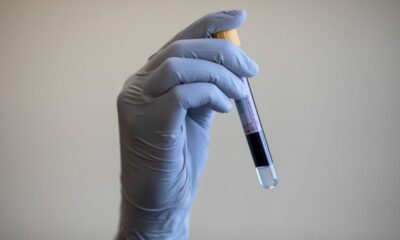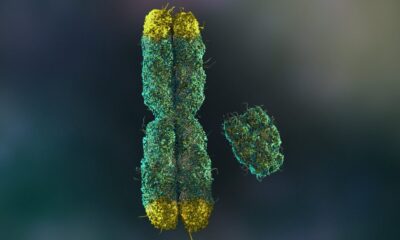Science
DNA Analysis Unveils Surprising Insights into Hitler’s Ancestry

Groundbreaking DNA analysis of a blood-stained fabric linked to Adolf Hitler has revealed significant findings about the dictator’s ancestry and potential health issues. Conducted by an international team of experts, the research has debunked longstanding rumors about Hitler’s Jewish lineage and identified a genetic disorder affecting sexual organ development. The study used a piece of fabric believed to contain Hitler’s blood, cut from a sofa in his Berlin bunker, where he died in 1945.
The fabric, now displayed at the Gettysburg Museum of History, was taken by Colonel Roswell P. Rosengren of the US Army after the war. The researchers confirmed the fabric’s authenticity by matching its Y-chromosome to a DNA sample from a male relative collected a decade earlier. This analysis marks the first time Hitler’s DNA has been sequenced, offering a unique glimpse into the genetic makeup of one of history’s most notorious figures.
Among the revelations, the study concluded that Hitler did not have any Jewish ancestry, a rumor that has persisted since the 1920s. Additionally, the researchers determined he had Kallmann syndrome, a genetic disorder that can influence puberty and sexual organ development. This has prompted speculation about Hitler’s personal life, particularly regarding his apparent lack of a private life. Dr Alex Kay, a historian featured in the documentary “Hitler’s DNA: Blueprint of a Dictator,” suggested the findings could shed light on Hitler’s obsessive dedication to politics.
The analysis also indicated that Hitler had a high predisposition for autism, schizophrenia, and bipolar disorder, as determined through polygenic scoring. This scoring method assesses a person’s likelihood of developing certain conditions based on their DNA compared to a broader population. Experts have emphasized that these findings do not equate to a diagnosis but rather indicate potential predispositions.
Concerns have emerged regarding the implications of these findings, particularly the risk of stigmatization and the ethics of studying Hitler’s DNA without his consent or that of any direct descendants. In the documentary, Prof Turi King expressed her initial hesitation to participate in the project, stating, “I agonised over it.” She emphasized the importance of conducting the research with academic rigor and ethical considerations.
The UK’s National Autistic Society criticized the findings, labeling them a “cheap stunt” and highlighting the insensitivity towards autistic individuals. Tim Nicholls, the organization’s assistant director of research, stated that autistic people “deserve better than this.”
In response to the backlash, Channel 4 defended the documentary’s title, arguing that “DNA is colloquially known as the ‘blueprint of life.'” The network asserted its commitment to making complex scientific ideas accessible while ensuring the portrayal of Hitler’s genetic insights does not suggest biological predestination for his actions.
The ethical dimensions of this research raise difficult questions. Some historians argue that the examination of Hitler’s DNA is justified given the historical context and the lack of direct descendants. As Prof King noted, “Who makes that decision?” This sentiment was echoed by historian Subhadra Das, who acknowledged that DNA sampling of long-dead figures is common in science and archaeology.
The study’s completion and ongoing peer review mean that the full findings will soon be available. While some historians support the research as a means to better understand extremism, others caution against oversimplifying the complexities of historical figures through genetic analysis. Dr Iva Vukusic, an assistant professor of international history at Utrecht University, expressed skepticism about the validity of deriving explanations for Hitler’s actions from DNA testing.
As the debate surrounding this research continues, it highlights the need for careful consideration in how genetic insights are communicated to the public. The responsibility lies with both scientists and media to ensure that findings are presented accurately, avoiding any potential for stigmatization or misinterpretation. The discussions surrounding this groundbreaking study emphasize the intricate relationship between genetics, history, and the ethical implications of scientific inquiry.
-

 Entertainment3 months ago
Entertainment3 months agoAnn Ming Reflects on ITV’s ‘I Fought the Law’ Drama
-

 Entertainment4 months ago
Entertainment4 months agoKate Garraway Sells £2 Million Home Amid Financial Struggles
-

 Health2 months ago
Health2 months agoKatie Price Faces New Health Concerns After Cancer Symptoms Resurface
-

 Entertainment2 months ago
Entertainment2 months agoCoronation Street’s Carl Webster Faces Trouble with New Affairs
-

 Entertainment2 months ago
Entertainment2 months agoWhere is Tinder Swindler Simon Leviev? Latest Updates Revealed
-

 Entertainment4 months ago
Entertainment4 months agoKim Cattrall Posts Cryptic Message After HBO’s Sequel Cancellation
-

 Science4 weeks ago
Science4 weeks agoBrian Cox Addresses Claims of Alien Probe in 3I/ATLAS Discovery
-

 Entertainment3 months ago
Entertainment3 months agoMarkiplier Addresses AI Controversy During Livestream Response
-

 Entertainment2 months ago
Entertainment2 months agoOlivia Attwood Opens Up About Fallout with Former Best Friend
-

 Entertainment3 months ago
Entertainment3 months agoMasterChef Faces Turmoil as Tom Kerridge Withdraws from Hosting Role
-

 Entertainment4 months ago
Entertainment4 months agoSpeculation Surrounds Home and Away as Cast Departures Mount
-

 World2 months ago
World2 months agoCole Palmer’s Mysterious Message to Kobbie Mainoo Sparks Speculation





















